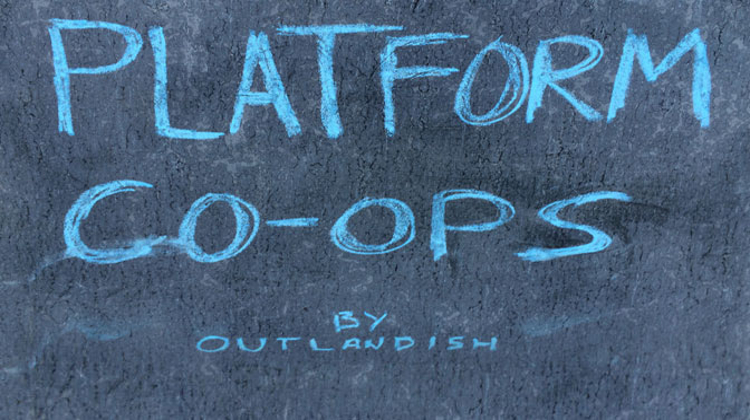This post was originally published on the The Open Co-op blog
Saturday night is not the time most people chose to meet to discuss disrupting democracy. But that’s what happened at the Platform Co-ops event in London on the 21st of May 2016.
Whilst most of Brick Lane was quaffing vast quantities of craft beer and sipping organic low-fat soya lattes with tofu sprinkles whist discussing how awesome it was that #rainbowunicornkittens was trending on twitter, over the road at New Speak House, a collection of hackers, designers, systems thinkers and aspiring cooperators gathered to discuss the bourgeoning movement know as Platform Co-ops.
New speak House is an amazing place founded to “foster the creation of technology to disrupt the UK political / media / government complex” and it is doing exactly that. It’s an events venue, community space, residential incubator and general hangout set up for people who want to change society with technology, and meet other people with similar interests, the perfect place for progressive peers to plot.
The Platform Co-ops event was organised and sponsored by the excellent Outlandish which meant everyone was suitably furnished with bagels and beer absolutely free, a fitting start to a co-operative gathering, which was kicked of by Nathan Schneider, organiser of the Platform Co-ops event in New York last November.
Nathan is a journalist who, along with Trebor Scholz, has helped elevate the subject of Platform Co-ops into the zeitgeist. Whether the newfound interest in Platform Co-ops simply reflects the growing unease with the rise of the deathstar platforms like Uber, or is the makings of a movement to disrupt democracy remains to be seen but the buzz from the brains at New Speak house certainly implied the later.

Nathan gave a great introduction, framing the debate superbly; it’s all about ownership and governance. The so called “sharing economy” platforms which “share” their apps with consumers and producers whilst rinsing value from them to make venture capitalists rich, is not really sharing at all. True sharing organisations share the organisation too, by making members owners with real democratic voting rights, enabling them to have a say in the decision by which they are affected.

Next up was Felix Weth, founder Fairmondo, a German, co-operative, alternative to Amazon, which is owned and managed by its members. Felix spoke extremely candidly about the difficulties of putting Platform Co-operativism into practice. Building a working alternative to the worlds biggest online retailer is never going to be easy and it was refreshing to hear about Fairmondo’s open philosophy. Felix showed how any profits they generate are split four ways with 25% going to: Owners of shares in the co-op, People who have earned Fair Founding Points, to other Non Profits, and the final 25% to upscaling Fairmondo. I’ve never seen a founder of a company openly present a slide showing the status of their bank account before! We’ll be keeping a keen eye out for the UK version of Fairmondo, coming soon.

Last up was Sarah Gold, creator of the concept “Alternet”, an open source, peer produced, run, owned and maintained version of the internet. Sarah’s work on Personal Data Licences which was exhibited at the Big Bang Data exhibition at Sommerset House kicked off some interesting discussions. In a post Snowden world the idea of owning your own data, as well as the platforms and other organisations upon which you depend is an inciting proposition.

If the growing number of other examples of member owned platforms and co-ops we heard about are anything to go by, Platform Co-operativism is a concept that is only just getting started. Whether it can actually manage to disrupt democracy remains to be seen but the only way that is going to happen is if we (the people) make it happen.
Sign up at 2016.open.coop to be kept up to date about the two day conference on Platform Co-ops that is being planned for London later this year.
—
@defactodesign

Leave a Reply